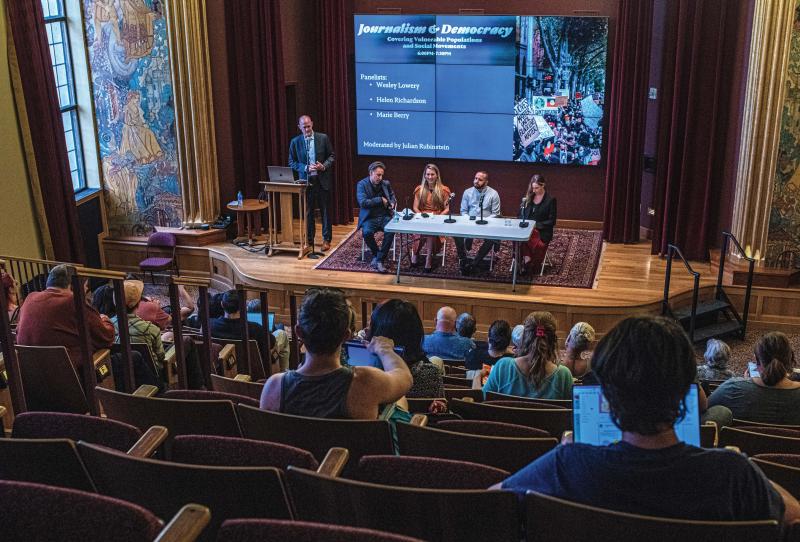Journalism & Democracy Dialogue Hosted for First Time in Spring 2023

Written by Katie Yeager
Content Warning: Gun Violence
On Wednesday, May 3, the MFJS department, CAHSS, Sie Cheou-Kang Center and the Korbel School of International Studies hosted Journalism and Democracy: Lessons and Reflections from Covering Vulnerable Populations and Social Unrest. Panelists for this event included Wesley Lowery, a Pulitzer Prize-winning journalist, Marie Berry, the Associate Director of the Sie Cheou-Kang Center, and Helen Richardson, a veteran photographer for the Denver Post. The panel was moderated by Julian Rubenstein, author of The Holly and a visiting professor here at the University of Denver in the practice of Journalism and Democracy.
With global, national, and local perspectives on covering controversial issues, the talks served as an open dialogue for how to improve journalistic practices and respectfully cover stories on vulnerable populations. Rubenstein opened the conversation with a question for Lowery, asking him what pushed him to write American Whitelash, his Pulitzer Prize-winning publication that focuses on cyclical racial violence and its repercussions since the 2008 election of President Obama.
Lowery gave an in-depth answer, stating, “We live in a time where the majority of our country feels particularly agitated about the changes that are happening. In that moment, evil forces have used that agitation to try to push further hatred and to convince people to carry out acts of violence, and those victims of violence are immigrants, Black Americans, Jewish Americans, Muslim Americans.”
Shifting the focus to Berry, she discussed her role on the panel as having the ability to frame these trends in a more global context. Berry said, “2019 was the foremost year on record for protests across the world, there were more people involved with protests and movements were happening in more countries than ever before, and of course, this comes to a pretty remarkable halt in 2020.”
Berry went on to say that these movements included so many different groups and were extremely vibrant and diverse. She spoke about her work at DU after the 2016 election where she and her colleagues realized that there would be groups of people “holding the line” against these movements and that Trump’s presidency was not an isolated instance, but rather one piece of the puzzle within a larger global trend.
Finally, Richardson spoke about her personal experiences covering rallies and protests in the Denver area. One experience in particular stood out to her, a Patriot rally that was held downtown where a press security guard pulled out a gun and shot an attendee point blank right in front of her eyes and camera lens.
Richardson spoke about the repercussions of releasing these photos to the public, stating that as a journalist, it is her responsibility to provide viewers of her photos with an objective perspective, and that both sides in a conflict always need to be considered. Throughout the talks, Richardson's biggest qualm with the journalism industry is the capitalist nature, knowing that many journalists are underpaid and end up leaving the profession or moving on to higher-paying companies that may not believe in journalistic ethics as deeply.
“Younger people are bringing different conversations to [journalism], different ways at looking at things, [and] more representation in the newsroom. The Colorado Sun is a good example… it is not based in advertising dollars, it’s run by nonprofit organizations. Is that the way journalism could go? Probably, hopefully,” said Richardson.
The members of the panel all seemed in agreement with Richardson’s statements about the capitalistic hold that is on the modern journalism industry. Going off of her ideas about the topic, Lowery added his perspective of how capitalism can be seen impacting journalistic quality on a national scale as well.
The talk ended with a Q&A session that allowed members of the audience to ask the panelists questions about the state of journalism and democracy, how to improve things as citizens on a local scale, and what to look for in terms of reporting misinformation.


